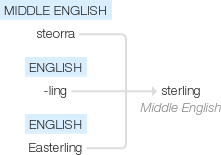Sterling
Middle English: probably from steorra ‘star’ + -ling (because some early Norman pennies bore a small star). Until recently one popular theory was that the coin was originally made by Easterling moneyers (from the ‘eastern’ Hanse towns), but the stressed first syllable would not have been dropped.
wiktionary
From Middle English sterling, sterlinge, sterlynge, starling, of uncertain origin. Possibly from sterling(“starling”)(the bird), which at one time was engraved on one quarter of the coin; or perhaps from Middle English sterre(“star”) + -ling (as in shilling), as some Norman coins presumably featured stars on them.
For the UK currency gloss, the term is a contraction of esterling, referring to eastern merchants from Baltic towns who established a bullion weight standard for transactions. (Taylor and Palmer, 1968)
etymonline
sterling (n.)
c. 1300, "silver penny," perhaps from Middle English sterre (see star (n.)), according to OED "presumably" from the stars that appeared in the design of certain Norman coins, + diminutive suffix -ling. But starred coins were not especially common among Anglo-Saxon currency, and the stars on them tended to be small. The other theory [Kluge] is that it derives from Old French estedre "stater" (see stater). Sense broadened by 1560s to "money having the quality of the sterling," and c. 1600 to "English money in general." As an adjective from early 15c. From 1640s in general sense of "capable of standing a test" (as a sound coin would). A pound sterling was originally "a pound weight of sterlings," equal to about 240 of them.
